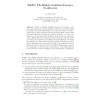Free Online Productivity Tools
i2Speak
i2Symbol
i2OCR
iTex2Img
iWeb2Print
iWeb2Shot
i2Type
iPdf2Split
iPdf2Merge
i2Bopomofo
i2Arabic
i2Style
i2Image
i2PDF
iLatex2Rtf
Sci2ools
OTM
2007
Springer
2007
Springer
HARC: The Highly-Available Resource Co-allocator
HARC—the Highly-Available Resource Co-allocator—is an open-source system for reserving multiple resources in a coordinated fashion. HARC can handle different types of resource, and has been used to reserve time on supercomputers across a US-wide testbed, together with dedicated lightpaths connecting the machines. At HARC’s core are a distributed set of processes called Acceptors, which provide a co-allocation service. HARC functions normally provided a majority of the Acceptors are working; this replication gives HARC its high availability. The Paxos Commit protocol ensures that consistency across all Acceptors is maintained. This paper gives an overview of HARC, and explains both how it works and how it is used. We show that HARC’s design makes it easy for the community to contribute new components for co-allocating different types of resource, while the stability of the overall system is maintained.
| Added | 08 Jun 2010 |
| Updated | 08 Jun 2010 |
| Type | Conference |
| Year | 2007 |
| Where | OTM |
| Authors | Jon MacLaren |
Comments (0)

